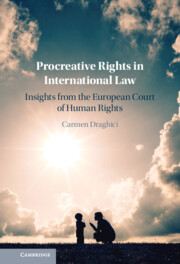Book contents
- Procreative Rights in International Law
- Procreative Rights in International Law
- Copyright page
- Dedication
- Contents
- Table of International Cases
- Table of International Instruments
- Introduction
- 1 Parenthood Aspirations and Justiciable Rights
- 2 A Right to a Genetically Related Child?
- 3 A Right to the Recognition of Intentional Parenthood?
- 4 A Right to a Healthy Child?
- 5 The Quest for Reproductive Equality
- Conclusions
- Select Bibliography
- Index
2 - A Right to a Genetically Related Child?
Published online by Cambridge University Press: 26 April 2024
- Procreative Rights in International Law
- Procreative Rights in International Law
- Copyright page
- Dedication
- Contents
- Table of International Cases
- Table of International Instruments
- Introduction
- 1 Parenthood Aspirations and Justiciable Rights
- 2 A Right to a Genetically Related Child?
- 3 A Right to the Recognition of Intentional Parenthood?
- 4 A Right to a Healthy Child?
- 5 The Quest for Reproductive Equality
- Conclusions
- Select Bibliography
- Index
Summary
Chapter 2 explores the right to make use of medically assisted procreation to conceive a child, upheld by the Strasbourg Court as an expression of private and family life. It discusses limitations based on ‘the rights of others’ (e.g. the other gamete provider in disputes over embryos) and ‘morals’ (e.g. public policy objections to heterologous fertilisation, surrogacy and the posthumous use of cryopreserved gametes/embryos). The chapter argues that the refusal to treat couples with donated gametes imposes a choice between genetic parenthood and the continuance of marriage to an infertile spouse, affecting both prospective and existing family life. It further maintains that reproductive autonomy should extend to posthumous reproduction where the deceased left advance directions and there are no overriding child welfare concerns. The chapter notes the recognition of legal ties between children and genetic parents in foreign surrogacy cases, albeit exclusively through the lens of children’s privacy (identity) rights.
Keywords
- Type
- Chapter
- Information
- Procreative Rights in International LawInsights from the European Court of Human Rights, pp. 41 - 109Publisher: Cambridge University PressPrint publication year: 2024

